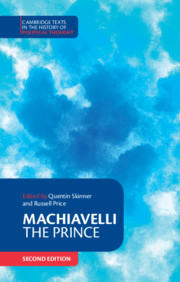4095 results in Texts in political thought
8 - Eliminating Debt from the Realm below Heaven
- from Part1
-
- Book:
- Kumazawa Banzan: Governing the Realm and Bringing Peace to All below Heaven
- Published online:
- 05 December 2020
- Print publication:
- 26 November 2020, pp 41-42
-
- Chapter
- Export citation
4 - A Grand Project for Growing Wealth
- from Part1
-
- Book:
- Kumazawa Banzan: Governing the Realm and Bringing Peace to All below Heaven
- Published online:
- 05 December 2020
- Print publication:
- 26 November 2020, pp 15-21
-
- Chapter
- Export citation
5 - Eliminating Anxieties over Flooding and Relieving Droughts
- from Part1
-
- Book:
- Kumazawa Banzan: Governing the Realm and Bringing Peace to All below Heaven
- Published online:
- 05 December 2020
- Print publication:
- 26 November 2020, pp 22-30
-
- Chapter
- Export citation
Contents
-
- Book:
- Kumazawa Banzan: Governing the Realm and Bringing Peace to All below Heaven
- Published online:
- 05 December 2020
- Print publication:
- 26 November 2020, pp v-vi
-
- Chapter
- Export citation
Cambridge Texts in the History of Political Thought
-
- Book:
- Kumazawa Banzan: Governing the Realm and Bringing Peace to All below Heaven
- Published online:
- 05 December 2020
- Print publication:
- 26 November 2020, pp 114-118
-
- Chapter
- Export citation
Index
-
- Book:
- Kumazawa Banzan: Governing the Realm and Bringing Peace to All below Heaven
- Published online:
- 05 December 2020
- Print publication:
- 26 November 2020, pp 105-113
-
- Chapter
- Export citation
6 - Preparing for Northern Barbarians, Emergencies, and Bad Harvests
- from Part1
-
- Book:
- Kumazawa Banzan: Governing the Realm and Bringing Peace to All below Heaven
- Published online:
- 05 December 2020
- Print publication:
- 26 November 2020, pp 31-35
-
- Chapter
- Export citation
17 - Reviving Shintō
- from Part 2
-
- Book:
- Kumazawa Banzan: Governing the Realm and Bringing Peace to All below Heaven
- Published online:
- 05 December 2020
- Print publication:
- 26 November 2020, pp 74-77
-
- Chapter
- Export citation
22 - Wasted Rice and Grain
- from Part 2
-
- Book:
- Kumazawa Banzan: Governing the Realm and Bringing Peace to All below Heaven
- Published online:
- 05 December 2020
- Print publication:
- 26 November 2020, pp 98-100
-
- Chapter
- Export citation
13 - Eliminating Landless Income and Increasing New Fiefs
- from Part 2
-
- Book:
- Kumazawa Banzan: Governing the Realm and Bringing Peace to All below Heaven
- Published online:
- 05 December 2020
- Print publication:
- 26 November 2020, pp 63-64
-
- Chapter
- Export citation
12 - Returning to the Old Farmer-Samurai Society
- from Part 2
-
- Book:
- Kumazawa Banzan: Governing the Realm and Bringing Peace to All below Heaven
- Published online:
- 05 December 2020
- Print publication:
- 26 November 2020, pp 57-62
-
- Chapter
- Export citation
21 - A Little Kindness Provides Benefits
- from Part 2
-
- Book:
- Kumazawa Banzan: Governing the Realm and Bringing Peace to All below Heaven
- Published online:
- 05 December 2020
- Print publication:
- 26 November 2020, pp 96-97
-
- Chapter
- Export citation
Frontmatter
-
- Book:
- Kumazawa Banzan: Governing the Realm and Bringing Peace to All below Heaven
- Published online:
- 05 December 2020
- Print publication:
- 26 November 2020, pp i-iv
-
- Chapter
- Export citation
18 - Worthy Rulers Reviving Japan
- from Part 2
-
- Book:
- Kumazawa Banzan: Governing the Realm and Bringing Peace to All below Heaven
- Published online:
- 05 December 2020
- Print publication:
- 26 November 2020, pp 78-82
-
- Chapter
- Export citation
11 - The Ebb and Flow of the Ruler’s Blessings
- from Part 2
-
- Book:
- Kumazawa Banzan: Governing the Realm and Bringing Peace to All below Heaven
- Published online:
- 05 December 2020
- Print publication:
- 26 November 2020, pp 55-56
-
- Chapter
- Export citation
3 - Revering Good Counsel
- from Part1
-
- Book:
- Kumazawa Banzan: Governing the Realm and Bringing Peace to All below Heaven
- Published online:
- 05 December 2020
- Print publication:
- 26 November 2020, pp 13-14
-
- Chapter
- Export citation
9 - Helping Rōnin, Vagrants, the Unemployed, and the Impoverished
- from Part1
-
- Book:
- Kumazawa Banzan: Governing the Realm and Bringing Peace to All below Heaven
- Published online:
- 05 December 2020
- Print publication:
- 26 November 2020, pp 43-44
-
- Chapter
- Export citation
Bibliography
-
- Book:
- Kumazawa Banzan: Governing the Realm and Bringing Peace to All below Heaven
- Published online:
- 05 December 2020
- Print publication:
- 26 November 2020, pp 101-104
-
- Chapter
- Export citation
20 - Those Who Should Teach in Our Schools
- from Part 2
-
- Book:
- Kumazawa Banzan: Governing the Realm and Bringing Peace to All below Heaven
- Published online:
- 05 December 2020
- Print publication:
- 26 November 2020, pp 92-95
-
- Chapter
- Export citation

Machiavelli: The Prince
-
- Published online:
- 14 July 2020
- Print publication:
- 03 January 2019
-
- Textbook
- Export citation

